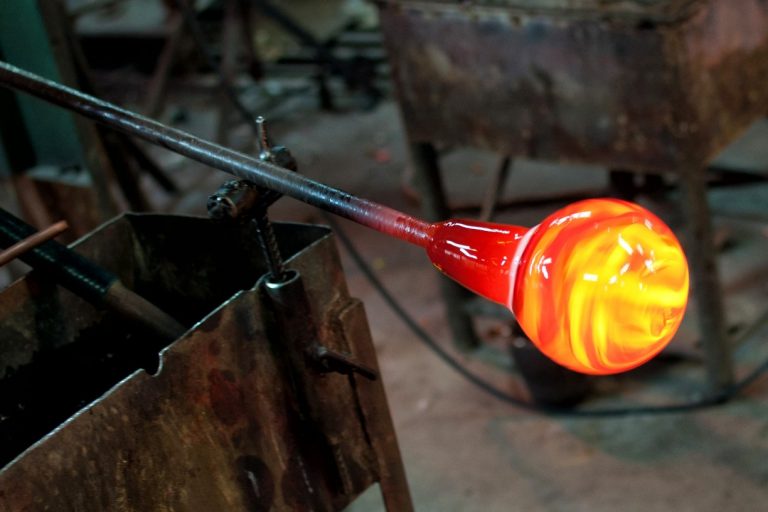Glass City: History of Krosno Glass
In official archives of Krosno, the first glass workshops were mentioned in the first half of the 16th century. The artefacts found in the area of the market square also confirm the presence of the glass workshop in the town. Unfortunately, no precise record of that activity has survived till the present day.
The modern glass industry appeared four centuries later. On May 31st, 1920, the company called Polish Glassworks Stock Company was officially registered and in 1923 the first modern production plant was built on the land acquired from Countess Kaczkowska. The company, which started the production in 1924, very soon gained recognition in the market, and, in 1929, it was awarded with the Gold Medal and diploma for the quality of their products by Eugene Kwiatkowski, the Minister of Industry and Trade, on The National Trade Fairs in Poznan, Poland. That success was possible thanks to a modern approach to human resources management. Good salaries attracted many specialists from the neighbouring countries or other parts of Poland, including the Lower Silesia region, where the production of glass had been held from the Middle Ages. They taught local apprentices, making a good foundation for further generations of highly skilled glass workers.
The production was stopped for a short time due to the WWII blitzkrieg but the occupants restarted it in 1940. The brand of the company was so well recognised at that time that the Germans did no change it. The company war run under the name of 'POLNISCHE GLASHUTTEN AKTIENGESELLSCHAFT’. In 1944, due to the military campaign, the production stopped. Moreover, the Germans destroyed the plant and stole valuable equipment.
— Glass City Krosno
Yet, as early as in January of 1945 the company was restored and the production restarted. The production building was covered with a roof taken from one of the local aircraft hangars. Thanks to that fact it is still the only European glass workshop that is covered with a wooden roof.
The demand for the products was enormous, no wonder that the company was considerably enlarged in the following decades. The Technical Glass Plant 'Polanka’ was built in 1958, the second plant of Krosno in 1969 (eventually, the machine production was placed there) and the Glass Fibre plant in 1971. The name of the company was changed to Krośnieńskie Huty Szkła (Krosno Glassworks) in 1958. At the times of a largest production volume the company employed almost 7000 workers and, being the biggest glass producer in Poland, it was also one of the largest in Europe.
In order to cover the glasswork’s demand for skilled workers the Secondary Glass Technical School was established in 1959. It’s well skilled graduates enabled the company’s designers to introduce their beautiful designs into production. The skill of the local blowers and technologists was also the foundation of the of the highly valued brand of Krosno glass. The crystal clear material was turned into beautiful glass objects, also into household items, which set the directions for the development of the Polish industrial design.
The glass products of Krosno won many awards at national and international fairs, no wonder, thus, that after the fall of communism, Krosno Glassworks, as one of the first five companies, was introduced into the Warsaw Stock Exchange in 1991. Since 2001 the company has been operating in the group of several production plants under the common name of Krosno Group. Nowadays, even though the situation on the international markets and particularly in the branch of glass production is very complicated, Krosno Glassworks still develop and remain a key supplier of glass items. Its products are highly valued for their quality and design, be it manual or machine make. It is worth mentioning that one of the group’s company, Krosglass SA, successfully continues the tradition of producing fibre glass and is currently the only manufacturer of such products in Poland.
The transition to the free market economy in the early 90’s set the environment for establishing many smaller, privately owned glassworks in the region, many of which still operate. The craft and profession of glass manufacturing, passed from fathers on sons, created many 'glass families’ that developed the glass heritage for generations. The products of such companies as, for instance, JDM Kazana, Deco Glass, Galicjan, Huta Jozefina, Makora, Huta Sabina or Huta Tarnowiec very soon caught the eye of customers in every part of the world, strengthening the image of Krosno as the 'heart of the Polish industry’.
There have appeared many more glassworks or glass processing workshops for the past several decades. Some of them ceased production, some new appeared in their place. Nowadays, there are still many which work as artistic studios. They offer different types of products from household glass to unique glass sculptures, gifts, trophies, jewellery, decorative architectural glass or custom made glass objects. Krosno glass remains well known in European Union, United States, Australia, Japan or Arab states.
Krosno lived and still exist in the 'glass environment’- most of the local families are this way or another bound to glass. Glass items bearing KROSNO stickers, displayed in the most prestigious shops, have made the name of the town famous worldwide.
Glass Heritage Centre Krosno, PL
Blich 2 Street
38-400 Krosno
email: rezerwacje@miastoszkla.pl
Reservations
+48 13 44 400 31
Admission
Main building – 33 PLN
Main building and threshold cellars – 42 PLN
Threshold cellars – 12 PLN
Family Ticket – 35 PLN per person
The disabled – 27 PLN
Senior Ticket – 35 PLN
Children up to 5 years old – free of charge
Admission
Groups
Schools (visiting + glass workshops) – 50 PLN / person
Up to 7 years old group ticket (visiting + glass workshops) – 44 PLN/person
Copyright © 2025 CDS Krosno | All rights reserved | Designed and Developed by 4io.pl




